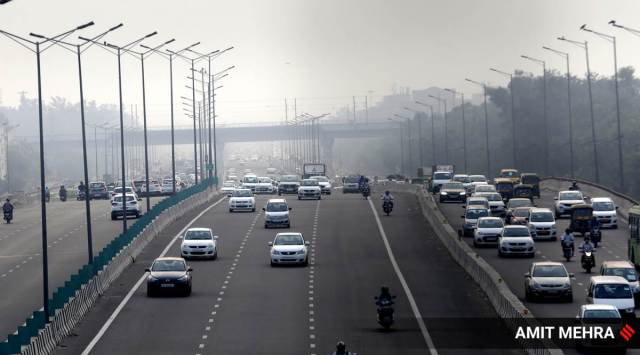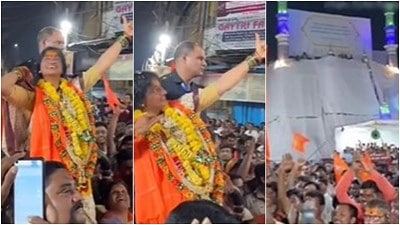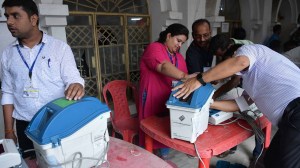- India
- International
To fight NCR pollution, a new body under law
The Commission, which will monitor and check air pollution levels in the region, will supersede all existing bodies, including the Central Pollution Control Board (CPCB), as well as state governments in matters of air pollution mitigation.
 Pollutions levels breached the emergency threshold twice this month in the national capital as a grey apocalyptic smog enveloped the city for days, blotting out the sun and smudging landmarks from view.(File photo)
Pollutions levels breached the emergency threshold twice this month in the national capital as a grey apocalyptic smog enveloped the city for days, blotting out the sun and smudging landmarks from view.(File photo)The central government on Wednesday notified an Ordinance to constitute a Commission for Air Quality Management in the National Capital Region (NCR) and Adjoining Areas.
The Commission, which will monitor and check air pollution levels in the region, will supersede all existing bodies, including the Central Pollution Control Board (CPCB), as well as state governments in matters of air pollution mitigation.
Through the Ordinance, the Centre has dissolved the Environment Pollution (Prevention and Control) Authority (EPCA) for the NCR. Officials of the Union Ministry of Environment, Forest and Climate Change said that the new Commission would have more powers than the EPCA – in terms of penal provisions as well as in its constitution and scope.
The EPCA, which was set up in 1998, looked at the NCR; the purview of the new Commission extends to “adjoining areas as well”, the officials said.
“We are setting up a Commission to look specifically at air pollution mitigation for the Delhi NCR and its adjoining areas. This is because for air pollution to be controlled in the region, we need to look holistically at the air shed which does not adhere to geographical boundaries. It will also facilitate more effective implementation as the permanent Commission envisages a multi-sectoral, public participatory, multi-state dynamic body for combating pollution,’’ Environment Minister Prakash Javadekar said.

He added that a regulatory mechanism for stubble burning is being put into place for the first time.
The Ordinance says that while “a committee appointed under the Environment Protection Act (1986) has taken measures to tackle air pollution, as have orders issued by various courts including the Supreme Court, the quality of air has remained a cause for concern – and it was felt necessary to set up a statutory body with appropriate powers to deal with it on a war footing.”
Sources in the Ministry said it will now be binding on state governments to follow the directions of the Commission regarding air quality management.
“There have been some practical problems in dealing with air pollution. While we do have the CPCB, the organisation’s mandate is to serve the whole country. This Commission will specifically look at the Delhi NCR and adjoining areas only. The problem with the air pollution in Delhi is that the source of the pollution lies elsewhere – that is why it is important to tackle the whole region. The SPCBs also report to state governments, and therefore, there are some practical problems there that needed to be resolved,’’ a senior MoEF official said.
The monitoring and management of air quality in the Delhi NCR region has so far been done piecemeal by multiple bodies including the CPCB, state pollution control boards, the state governments of Delhi, Haryana, Utttar Pradesh, and Rajasthan, and the EPCA.
The new 18-member Commission brings together the Centre, states, and other stakeholders on one collaborative platform. It will have a full-time chairperson “who is or has been Secretary to the Government of India or Chief Secretary to the Government of a state”, and a representative of the Secretary of the Environment Ministry “who shall be an officer not below the rank of Joint Secretary, ex officio”.
The Commission will also have five ex officio members “who are either Chief Secretaries, or Secretaries in charge of the department dealing with environment protection in the States of Delhi, Punjab, Haryana, Rajasthan, and Uttar Pradesh”; two full-time members “who are or have been Joint Secretaries to the Government of India; three full-time independent technical members with “specific scientific knowledge and experience in matters relating to air pollution”; a technical member each from the CPCB and nominated by the Indian Space Research Organisation (ISRO), ex officio; three representatives of NGOs with experience in combating air pollution; and “one representative of the National Institution for Transforming India, not below the rank of Joint Secretary or Adviser, ex officio”.
Representatives from various other Ministries including Agriculture, Petroleum, Power, Road Transport and Highways, Housing and Urban Affairs, and Commerce and Industry will be associate members.
The Ordinance says “the Commission shall have exclusive jurisdiction in respect of matters covered by this Ordinance”. The penalty for non-compliance shall be imprisonment upto five years or fine upto Rs 1 crore, or both.
“This is a very welcome step and much needed because the key problem was how to coordinate among these states. There was no single body, authority, Ministry or state which was empowered or dedicated to do that,” Professor S N Tripathi, head of the Department of Civil Engineering at IIT Kanpur, and Member of the Steering Committee of the Environment Ministry’s National Clean Air Programme (NCAP), said.
Meanwhile, the Supreme Court on Thursday said it would take a look at the Ordinance before passing any directions on it. Solicitor General Tushar Mehta had told the Bench led by Chief Justice of India S A Bobde – which is hearing a petition seeking directions to Punjab, Haryana, and UP to completely stop stubble burning – on October 26 that the government was working on setting up a permanent body for air quality management in the region, and would come out with an Ordinance soon. The court had on October 16 appointed Justice (retd) Madan B Lokur to act as a one-man monitoring committee to check stubble burning, but had kept the order in abeyance after the government’s assurance.
Apr 19: Latest News
- 01
- 02
- 03
- 04
- 05






































